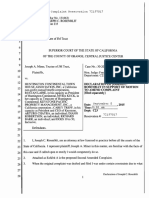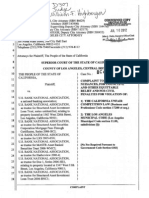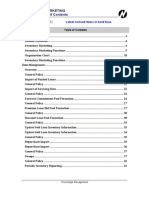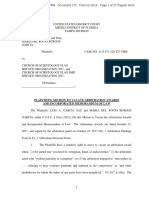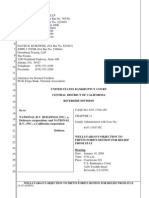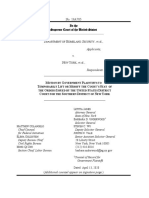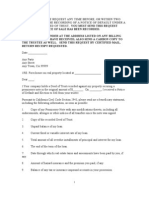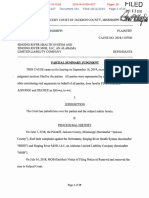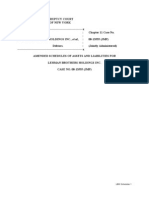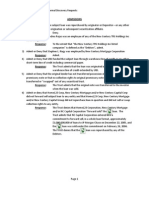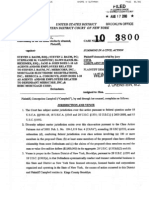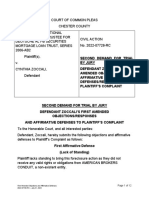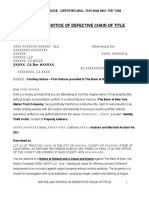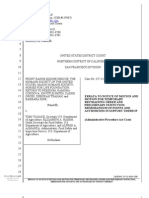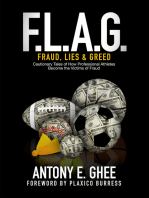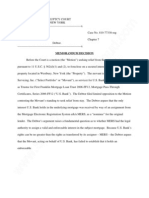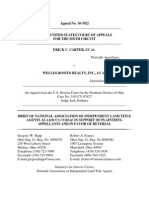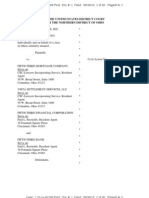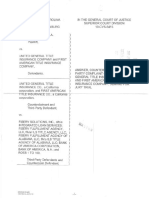Bank of America v. First American
Bank of America v. First American
Uploaded by
OAITACopyright:
Available Formats
Bank of America v. First American
Bank of America v. First American
Uploaded by
OAITACopyright
Available Formats
Share this document
Did you find this document useful?
Is this content inappropriate?
Copyright:
Available Formats
Bank of America v. First American
Bank of America v. First American
Uploaded by
OAITACopyright:
Available Formats
STATE OF NORTH CAROLINA
IN THE GENERAL COURT OF JUSTICE SUPERIOR COU ... ~~lc?IV~IONW.0-· Case No.: ~ J): C
t ' ~
COUNTY OF MECKLENBURG
Plaintiff,
COMPLAINT r--
BANK OF AMERICA, N.A.,
v.
UNITED GENERAL TITLE INSURANCE COMP ANY and FIRST AMERICAN TITLE INSURANCE COMPANY,
Defendants.
(Jury Trial Demanded)
C"';tll'"
:1
(,.J) -..J
Plaintiff Bank of America, N.A. ("Bank of America" or the "Bank"), for its Complaint
against defendants United General Title Insurance Company ("United General") and First
American Title Insurance Company ("First American") (collectively, "Defendants"), alleges and
says as follows:
I. PRELIMINARY STATEMENT
This lawsuit arises from thousands of insurance claims that Bank of America has
submitted to its insurers United General and First American, which are now corporate affiliates
or have been merged into the same company. United General and First American issued to Bank
of America certain master insurance policies and certificates of insurance under those policies
that provide coverage to the Bank for losses arising from, among other things, title defects,
vesting issues, undisclosed intervening liens, and legal description errors, each of which is
explained in more detail herein. Each of the claims asserted by Bank of America against United
General or First American arises from a home equity loan or line of credit made by Bank of
America that is now in default and as to which there exists an insured title defect or other issue,
causing a loss covered under an insurance policy and certificate issued by United General or
First American.
United General and First American have refused to pay Bank of America's claims as required under the policies and certificates and have failed to timely respond to the majority of the Bank's claims. As of February 2010, United General and First American have denied at least 2,200 of Bank of America's claims - representing more than $235,000,000 in losses sustained by the Bank - and have failed to timely respond to at least 2,300 of Bank of America's claimsrepresenting more than $300,000,000 in losses sustained by the Bank. United General and First American thus have breached the terms of their policies and acted in bad faith.
II. THE PARTIES, JURISDICTION, AND VENUE
1. Bank of America is a national bank with its headquarters and principal place of
business located in Charlotte, Mecklenburg County, North Carolina.
2. First American is an insurance company domiciled in California with its
headquarters and principal place of business located in California. Upon information and belief, First American is a direct or indirect subsidiary of First American Corporation.
3. Upon information and belief, United General is an insurance company domiciled
in California with its headquarters and principal place of business located in either California or Colorado.
4. Upon information and belief, on or about September 30, 2008, United General
transferred all or substantially all of its assets and liabilities to its parent company, First American. Upon information and belief, the transaction was completed pursuant to a written consent from the California Department of Insurance and an Instrument of Transfer and Assumption that makes First American liable for any liabilities of United General, including any liability United General may have to Bank of America arising from the insurance policies and certificates issued to the Bank and the claims asserted in this lawsuit. Thus, as to all claims
2
pleaded in this lawsuit against United General, Bank of America is seeking and is entitled to hold United General and First American jointly and severally liable for any liability of United General to Bank of America.
5. United General and First American are subject to personal jurisdiction in North
Carolina. Both Defendants issued the insurance policies and certificates of insurance at issue in this lawsuit to Bank of America located in North Carolina and have sent numerous letters denying claims to Bank of America in North Carolina.
6. Upon information and belief, both United General and First American have sold
thousands of insurance policies to other policyholders in North Carolina, in addition to the policies and certificates issued to Bank of America that are at issue in this lawsuit.
7. United General's website has stated that United General "is currently doing
business in all states and the District of Columbia." First America's website likewise has indicated that it does business in North Carolina. Both websites have included references to at least eight office locations for each company in North Carolina.
8. United General and First American purposefully have availed themselves of the
laws of the State of North Carolina and have established sufficient contacts with the State such that they are both subject to general and specific personal jurisdiction in this State for purposes of this lawsuit.
9. United General and First American additionally are subject to personal
jurisdiction in this State pursuant to N.C. Gen. Stat. § 1-75.4(10) and other provisions of N.C. Gen. Stat. § 1-75.4.
10. Venue is proper in this county pursuant to N.C. Gen. Stat. § 1-80 and/or § 1-82.
3
III. FACTUAL ALLEGATIONS
A. The QuickClose LPI Program
11. On or about April 1, 2004, Bank of America acquired FleetBoston Financial
Corp., including Fleet National Bank ("Fleet"). Prior to that time, Fleet had entered into an arrangement with Fiserv Solutions, Inc. d/b/a Integrated Loan Services ("Fiserv") pursuant to which Fiserv provided certain services to Fleet in connection with home equity loans and lines of credit closed by Fleet under a program referred to as the ILS QuickClose Lien Protection Insurance Program (the "QuickClose LPI Program").
12. After Bank of America's acquisition of Fleet, Bank of America adopted the
QuickClose LPI Program for its home equity lending business beginning in approximately October 2005 until December 2007. ("Bank of America" is used expansively herein to include Bank of America, N.A. and Fleet National Bank.)
13. United General and First American entered into a National Agency Agreement
with Fiserv appointing Fiserv as the agent of the insurers in connection with insurance policies issued by United General and First American to lenders that participated in the QuickClose LPI Program, including policies issued to Bank of America and Fleet.
14. Fiserv marketed the QuickClose LPI Program - for itself and on behalf of United
General and First American - as a replacement for conducting title searches in connection with the loans processed under the program. A basic premise of the program was that a participating lender would no longer conduct title searches in connection with loans processed under the program in order to verify ownership or to identify existing liens on the collateral property. Instead of conducting a traditional title search, a lender under the QuickClose LPI Program would rely on the borrower's statements made in applying for the loan, review a credit bureau
4
report for the borrower, and ask the borrower about any secured mortgages shown on the credit report not disclosed by the borrower in the loan application.
15. The QuickClose LPI Program included an insurance component intended to
protect the lender against any risks and losses resulting from the lender not conducting a title search prior to closing. Among other things, the insurance policies were intended to protect Fleet and Bank of America against the risks of certain types of title defects - including undisclosed intervening liens, vesting problems, and legal description errors - that would have been discovered had the Bank conducted a full title search.
16. An undisclosed intervening lien arises when a lien exists that is senior to Bank of
America's lien and Bank of America was not aware that the lien was a secured lien on the collateral property when it made its loan. For example, Bank of America may have intended to be in a second lien position when it made the loan, but an intervening lien not disclosed as a secured lien during the loan application process causes the Bank actually to have a third position. As a result of the undisclosed intervening lien, Bank of America is in a more junior lien position than it intended when it made the loan.
17. A vesting problem arises when Bank of America's mortgage does not include all
of the signatures necessary in order to make the Bank's mortgage effective as a lien on the entire collateral property. For example, a vesting problem may arise when the mortgage does not include a co-owner's signature or a spouse's signature in some circumstances. As a result of the vesting problem, Bank of America may not have an enforceable lien on the entire collateral property.
18. A legal description error arises when the legal description attached to the Bank's
mortgage does not match the legal description contained in the last deed of record conveying the
5
property. For example, the legal description attached to Bank of America's mortgage may
describe a different unit or lot than the property that was intended as the collateral property. As a
result of the legal description error, Bank of America may not have an enforceable lien on the
intended collateral property.
19. In marketing the QuickClose LPI Program to Fleet and Bank of America, Fiserv,
as agent for United General and First American, made the following statements about the
insurance to be provided under the program, among others:
"No limitations or restrictions: (including FICO score) for coverage under our program. All equity loans and lines of credit up to $500,000 are covered. "
"Coverage to lender for ALL title defects impairing lien position in case of default"
"Coverage for all undisclosed title issues that impair lender's lien priority"
20. Upon information and belief, United General and First American were informed
of and approved the manner in which Fiserv marketed the QuickClose LPI Program and the
insurance policies that would be provided under the program, including the above statements.
21. When Bank of America closed a loan under the QuickClose LPI Program, the
Bank would notify Fiserv of the new loan and, after loan closing, send the mortgage document to
Fiserv. Fiserv was responsible for attaching a legal description to the signed mortgage or deed of
trust and arranging for the signed mortgage or deed of trust to be recorded with the appropriate
register of deeds.
22. Bank of America paid a pre-determined fee to Fiserv on each loan as a premium
for insurance on the loan and for Fiserv's services in connection with the loan. On behalf of the
insurer, Fiserv issued to Bank of America a certificate of insurance to evidence that the loan was
6
insured under a QuickClose LPI Program master insurance policy issued by insurers such as United General and First American.
23. Under the QuickClose LPI Program, if Bank of America closed and funded a loan
and later discovered that it did not have an enforceable mortgage in the lien position in which Bank of America intended when it made the loan, the QuickClose LPI Program insurance policies were intended to reimburse the Bank for its losses.
B. The United General and First American Policies
24. United General issued to Bank of America an insurance policy bearing policy
number 22000002 and titled Residential Home Equity Mortgage Loan Policy (the "United General Master Policy"). In addition, in connection with some individual loans, United General issued other policies to Bank of America that contained or were intended to contain substantially similar terms as the United General Master Policy. (The United General Master Policy and all other policies issued by United General to Bank of America or Fleet in connection with the QuickClose LPI Program are referred to collectively herein as the "United General Policies.")
25. First American issued several policies to Fleet and/or Bank of America, including,
without limitation, FACT Master Loan Policy No.1 00066, FACT Master Loan Policy No. 100067, and FACT Master Loan Policy No. 100101 (collectively, the "First American Policies"). (The United General Policy and the First American Policies are referred to together as the "United General and First American Policies.")
26. As Fleet's successor, Bank of America is now the insured under any United
General Policies and First American Policies issued to Fleet.
27. Among other responsibilities as agent of United General and First American,
Fiserv was authorized to issue insurance certificates in connection with Fleet and Bank of
7
America loans processed under the QuickClose LPI Program. The issuance of an insurance
certificate meant that the loan at issue was insured under the applicable United General Policy or
First American Policy, and that the Bank had paid a corresponding premium to United General
or First American.
28. The United General and First American Policies insure Bank of America for the
following risks, among others:
a. The mortgagor shown in the Insured Mortgage' not being the named grantee on
the last document recorded in the Public Recorda' purporting to vest the
mortgagor's estate or interest in the title to the Land.3
b. The description of the Land not being sufficient to impart constructive notice to
purchasers and encumbrancers for value and without Knowledge."
c. Any Monetary LienS affecting the title recorded in the Public Records.
d. Invalid execution of the Insured Mortgage because of forgery, fraud, undue
influence, duress, incompetency, incapacity, or impersonation.
I "Insured Mortgage" is defmed as "the mortgage, deed of trust, deed to secure debt, or other security instrument, documented by the Named Insured and identified in and evidenced by a Transaction Certificate."
2 "Public Records" is defmed as "records established under state statutes at Date of Policy for the purpose of imparting constructive notice of matters relating to real property to purchasers for value and without knowledge."
3 "Land" is defmed as "the land described in the Insured Mortgage and improvements affixed thereto which by law constitute real property. The term Land does not include any property beyond the lines of the area described or referred to herein, nor any right, title, interest, estate or easement in abutting streets, road alleys, avenues, lanes, ways, or waterways."
4 "Knowledge" and "Known" are defmed as "actual knowledge, not constructive knowledge or notice which may be imputed to an Insured by reason of the Public Records."
5 "Monetary Lien" is defmed as "any mortgage, deed of trust, deed to secure debt, judgment lien or other lien affecting the title securing an obligation to pay money, but not including any lien created in an easement, covenant, condition, restriction, or declaration of condominium or planned unit development."
8
e. Unauthorized execution of the Insured Mortgage (a) under a falsified, expired or otherwise invalid power of attorney; or (b) by an entity established for estate planning purposes.
29. Each of the United General and First American Policies additionally include or were intended to include a credit endorsement that provided coverage for liens securing a debt listed as unsecured on the borrower's credit report reviewed by Bank of America in underwriting the loan.
30. Each of the United General and First American Policies additionally include or
were intended to include a gap endorsement that provided coverage for any liens or other title issues that arose during the time after execution of the mortgage until the mortgage was recorded.
C. Bank of America's Claims
31. As of February 2010, United General and First American have denied at least
2,200 of Bank of America's claims - representing more than $235,000,000 in losses sustained by the Bank - and have failed to timely respond to at least 2,300 of Bank of America's claimsrepresenting more than $300,000,000 in losses sustained by the Bank. United General and First American thus have breached the terms of their policies and acted in bad faith.
32. Prior to 2007, the majority of Fleet and Bank of America's claims submitted to
United General and First American under the QuickClose LPI Program were paid by the
Insurers.
33. Beginning in 2007, accelerating in 2008, and continuing in 2009, Bank of
America, like other lenders in the United States, experienced a dramatic increase in borrowers defaulting on their home mortgages. Those circumstances caused Bank of America to discover a
9
greater number of loans with insured title defects compared to what Bank of America historically had discovered. This in turn caused the Bank to submit a higher volume of claims to United General and First American than the Bank historically had submitted.
34. As Bank of America's claims volume increased in 2007 through 2009 compared
to what it had previously been, United General and First American made significant changes to their claims handling practices and stopped paying claims similar to the ones the insurers previously had paid, notwithstanding that the claims were submitted for coverage under the same United General and First American Policies that had been in effect before 2007.
35. After a Bank of America borrower defaulted on a home equity loan that had been
processed and insured under the QuickClose LPI Program, Bank of America in some cases discovered a title defect that caused Bank of America to not be in the lien position that the Bank had intended when it made the loan, to not have a valid mortgage on the entire collateral property, or to not have a valid mortgage on the intended collateral property at all. In those circumstances, Bank of America submitted a claim for reimbursement under the applicable insurance policy, including the United General and First American Policies.
36. Each of the claims at issue in this lawsuit arises from a home equity loan or line
of credit made by Bank of America that is now in default, involves a title defect or other issue covered under the terms of the insurance policies issued by United General or First American, and has resulted in an insured loss to Bank of America.
37. The claims fall into three predominant categories, with some claims falling into
multiple of these categories: (The capitalized terms are defined for purposes of the rest of the Complaint as set forth below.)
10
a. Lien Position Claims. On these loans, Bank of America is not in the lien
position in which it intended to be - for example, a loan where Bank of America
intended to have the second lien on the property but in fact has the fourth lien on
the property as a result of two intervening liens that were not disclosed by the
borrower during the application process and were not listed as secured liens on
the borrower's credit report reviewed by the Bank during the loan application
process.
b. Vesting Claims. On these loans, Bank of America's mortgage was not signed by
all owners of the property or by all other person(s) required to sign the mortgage
in order for the mortgage to constitute an effective lien on the entire property -
for example, the lack of a signature by an undisclosed co-owner or an owner's
spouse in certain states;
c. Legal Description Claims. On these loans, the legal description attached to
Bank of America's mortgage does not match the legal description contained in the
last deed of record conveying the property to the owner(s). For example, the legal
description attached to Bank of America's mortgage may describe a different unit
or lot than the one that was intended as the collateral property. As a result, Bank
of America may not have an effective lien on the intended collateral property.
D. United General and First American's Breaches of Policy Terms by Denying Covered Claims
38. United General and First American have breached the terms oftheir policies and
breached their duty of good faith and fair dealing by denying Bank of America's claims that are
covered under the terms of the applicable policy, by failing to pay Bank of America's claims in a
timely manner required under the terms of the policies, and in other ways alleged herein.
11
39. Attached as Exhibit 1 is a report listing all or substantially all of Bank of
America's LPI claims that have been submitted to United General or First American that, as of
the filing of the Complaint, United General or First American has denied. The information in the
report is prepared and provided by Fiserv, United General and First American's agent. Exhibit 1
includes the claims that have been wrongfully denied by United General and First American for
the reasons set forth below.
(i) United General and First American's Loss Calculation Method Violates the Policies.
40. United General and First American have breached the policy terms in several
ways. First, United General and First American have applied a loss calculation methodology
inconsistent with the policy terms and the understanding between the parties when the policies
were issued.
41. The United General and First American Policies provide that Bank of America is
insured for its "actual monetary loss or damage sustained or incurred" by Bank of America
arising from a matter insured against under the policies. On each of the loans subject to a claim,
Bank of America has suffered an actual monetary loss in the form of the Bank's charge-off
amount or the unpaid principal balance on the loan that is in default.
42. United General and First American agreed and understood that they would
reimburse Bank of America the amount that the Bank charged off on any loan involving an
insured defect or the unpaid principal balance on the Bank's loan in default, subject to certain
limitations expressly contained in the policies.
43. When United General and First American issued their policies, these insurers,
through their agent Fiserv, indicated that a specific claim submission form would be used in the
event of a claim. That form contained a "Calculation of Loss" section. That section
12
contemplated that, in the event of an insured defect, Bank of America would submit its chargeoff amount as its amount of loss.
44. The claim submission form containing the Calculation of Loss section was
created by United General and First American's agent, Fiserv. Upon information and belief, United General and First American or their representatives were aware of and approved the claim submission form prior to issuing their policies.
45. As a result of the claim submission form in place and provided to Bank of
America when the United General and First American Policies were issued, as well as other information, Bank of America had a reasonable expectation to be paid its charge-off amount or unpaid principal balance as the amount of loss in the event of an insured defect under the United General and First American Policies.
46. The charge-off approach for calculating insured losses was consistent with the
terms of the United General and First American Policies providing that the Bank would be paid its "actual monetary loss" and the intent of the parties, as Bank of America would not have made the loans at issue and thus would not have sustained any loss on these loans had it been aware of the title defect at the time of originating the loan.
47. Instead of paying Bank of America its charge-off amount or unpaid principal
balance as contemplated, United General and First American have utilized a valuation-based method in determining whether a loss exists and in calculating losses on Bank of America's claims. Under their valuation-based method, United General and First American have purported to calculate Bank of America's losses based on a supposed value of the collateral property at some point after the loan is in default or after Bank of America submitted its claim.
13
48. The loss calculation approach employed by United General and First American
has no basis in the policies, is contrary to the intent of those policies, is contrary to the
reasonable expectations of Bank of America, and is contrary to applicable law.
49. United General and First American thus have breached their policies and acted in
bad faith in determining whether Bank of America has sustained a covered loss and in
calculating the amount of Bank of America's losses.
(ii) United General and First American Wrongfully Have Attempted to Impose a Foreclosure Requirement Contrary to the Terms and Intent of the Policies.
50. United General and First American wrongfully have denied claims on the ground
that the Bank has not foreclosed on the loan.
51. On the vast majority of the loans subject to a claim, Bank of America either
cannot foreclose on the loan or foreclosure would not make economic sense because of the
defect giving rise to the claim.
52. The United General and First American Policies contain no requirement that Bank
of America foreclose in order to pursue a claim.
53. Bank of America was told repeatedly by United General and First American's
agent, Fiserv, that foreclosure would not be required in order to pursue a claim under the United
General and First American Policies.
54. Nevertheless, United General and First American have refused to pay many of
Bank of America's claims unless Bank of America forecloses on the loan at issue, in violation of
the policy terms and in bad faith.
14
(iii) United General and First American Wrongfully Have Denied Lien Position Claims Based on Liens Not Shown on the Borrower's Credit Report as Secured.
55. United General and First American wrongfully have denied Lien Position Claims
when the intervening lien giving rise to the claim was not shown on the borrower's credit report
as secured or where the claim otherwise qualifies for coverage under the United General and
First American Policies.
56. The United General and First American Policies provide coverage to Bank of
America for undisclosed intervening liens. For purposes of Bank of America's claims and the
Complaint, an "undisclosed intervening lien" is a lien on the collateral property senior to Bank of
America's insured mortgage that (i) was not disclosed by the borrower and not listed as a secured
mortgage on the credit bureau report reviewed by Bank of America during the loan application
process or (ii) if listed on the credit bureau report as secured, a lien that the borrower indicated
was not secured by the property to be encumbered by the insured mortgage or that the borrower
indicated was paid in full and closed by the borrower. For example, Bank of America may have
made a loan intending to be in the second position, but an undisclosed intervening lien causes the
Bank to in fact be in a third position.
57. The loan underwriting process contemplated by the United General and First
American Policies was that the Bank would ask borrowers only about secured mortgage loans
shown on the borrower's credit report, not unsecured loans.
58. The United General and First American Policies included a credit endorsement
that provided (using the specific language of the United General Master Policy as an example),
"the Company hereby insures the insured against all loss or damage which the insured may
sustain by reason of a lien securing a debt shown on the credit report as unsecured."
15
59. In addition, in a letter dated November 5, 2005, First American stated on this
point, "Confirming our understanding, we will not interpose as a defense to our liability under any Master Policy we have issued in connection with the QuickClose program ... based on the existence ofa debt shown as secured on any credit report obtained by the Insured if the Insured obtains an affirmative statement from the Borrower that the debt is not secured by the real estate that is to be encumbered by the insured mortgage and/or has been paid in full and closed by Borrower provided that the Insured has no actual knowledge that the Borrower's statement is incorrect." United General made the same statement in a letter dated July 10,2006.
60. Under the terms of the United General and First American Policies, the Bank was
required to ask borrowers only about lines shown on the 'credit report reviewed by the Bank during underwriting as secured. This did not include lines listed on the credit report as revolving loans or installment loans, as opposed to a secured mortgage. If a loan was listed as a revolving loan or an installment loan on the borrower's credit report reviewed during loan underwriting, the United General and First American Policies did not require the Bank to ask the borrower about that loan. If such a line in fact was a mortgage on the collateral property that caused Bank of America to not be in its intended lien position, the United General and First American Policies provide coverage for the claim whether or not the loan officer asked the borrower about the line.
61. United General and First American have refused to pay Bank of America's Lien
Position Claims when the intervening lien giving rise to the claim was listed on the borrower's credit report obtained during underwriting in some manner other than as a secured line, including liens listed as a revolving or installment loan. In doing so, United General and First American repeatedly have breached the terms of the policies and acted in bad faith.
16
(iv) United General and First American Wrongfully Have Denied Lien Position Claims When Bank of America's Loan Officer Did Not Have Actual Knowledge of the Undisclosed Intervening Lienis) Giving Rise to the Claim.
62. United General and First American also have wrongfully denied many of Bank of
America's Lien Position Claims on the basis of an exclusion contained in the policies for
"[d]efects, liens, encumbrances, adverse claims or other matters: (a) created, suffered assumed or
agreed to by the Insured Claimant; (b) Known to the Insured Claimant, whether or not disclosed
in the Public Records .... ,,6
63. The United General Master Policy and certain of the First American Policies
define "Known" as "actual knowledge, not constructive knowledge or notice which may be
imputed to an Insured by reason of the Public Records" (emphasis added).
64. United General and First American have applied this "knowledgeexclusion" to
deny many of Bank of America's Lien Position Claims notwithstanding that the loan application
file does not show actual knowledge of the intervening lien by Bank of America when making
the loan, either from the borrower's representations or from the Bank's review of secured
mortgage lines on the credit bureau report.
65. United General and First American have gone so far as to deny Bank of
America's Lien Position Claims when the Bank's loan underwriting notes contain an affirmative
statement indicating that there were no liens on the collateral property other than those disclosed
by the borrower when applying for the loan.
66. On many of these claims, United General and First American appear to be
imposing - after the fact - a requirement that the Bank's loan underwriting system notes contain
6 The language quoted is from the United General Master Policy. United General and First American have relied on similar exclusions from other of the United General and First American Policies.
17
some "magic language" regarding liens on the collateral property never required under the terms
of the United General and First American Policies themselves.
67. United General and First American also wrongfully have denied Bank of
America's Lien Position Claims when the lien at issue was shown as a closed account on the
credit bureau report reviewed by the Bank during loan underwriting or otherwise shown on the
credit bureau report in a manner that did not give Bank of America knowledge of an open and
active secured mortgage that would cause Bank of America's lien to be in a more junior position
than the one intended when making the loan.
68. By denying Bank of America's Lien Position Claims when the borrower did not
disclose the intervening lien in applying for the loan and the lien was not listed as an open
secured mortgage line on the credit bureau report reviewed by the Bank during the loan
underwriting process, United General and First American have breached the terms of their
policies and acted in bad faith.
(v) United General and First American Wrongfully Have Denied Vesting
. Claims Based on Information and Documents Other Than the Borrower's Representations Concerning Ownership of the Property Made in Applying for the Loan at Issue.
69. United General and First American also wrongfully have denied Vesting Claims
based on information and documents other than the borrower's representations concerning
ownership of the property made in applying for the loan at issue.
70. The United General and First American Policies provide coverage to Bank of
America for vesting problems that cause Bank of America's mortgage to not constitute an
enforceable lien on the entire collateral property. The Vesting Claims arise from circumstances
when the Bank of America mortgage or deed of trust is lacking a signature of a party whose
18
signature was necessary in order for the Bank's mortgage to constitute an enforceable mortgage
on the entire collateral property.
71. The Vesting Claims typically arise from circumstances when (i) the borrower
failed to disclose a spouse and the applicable state law and/or vesting of the property on the last
deed conveying the property required the spouse's signature in order for the deed of trust or
mortgage to constitute an enforceable lien on the entire collateral property, and/or (ii) the
borrower failed to disclose one or more co-owners whose signatures were required in order for
the deed of trust or mortgage to constitute an enforceable lien on the entire collateral property.
72. When issuing their policies, United General and First American understood that
Bank of America would not conduct a full title search or otherwise confirm proper vesting prior
to closing the insured loans, and they understood that Bank of America would include vesting
information in the loan documents based on the borrower's representations about ownership
made in applying for the loan at issue.
73. United General and First American wrongfully have denied many of Bank of
America's Vesting Claims on the basis of an exclusion contained in the policies for "[d]efects,
liens, encumbrances, adverse claims or other matters: (a) created, suffered assumed or agreed to
by the Insured Claimant; (b) Known to the Insured Claimant, whether or not disclosed in the
Public Records .... ,,7
74. The United General Master Policy and certain of the First American Policies
define "Known" as "actual knowledge, not constructive knowledge or notice which may be
imputed to an Insured by reason of the Public Records" (emphasis added).
7 The language quoted is from the United General Master Policy. United General and First American have relied on similar exclusions from other of the United General and First American Policies.
19
75. In denying these claims, United General and First American have relied on
information that does not show that Bank of America's loan officer had actual knowledge of the undisclosed spouse or co-owner(s) at the time of making the loan and have acted contrary to the terms and intent of the United General and First American Policies.
76. For example, United General and First American have denied Bank of America's
Vesting Claims when the borrower did not disclose the spouse or co-owner(s) in the loan application but, according to United General or First American, the existence of the undisclosed spouse or co-owner(s) should have been known to the Bank by virtue of a loan file or loan application separate from the loan application at issue in the claim, an entry on a credit report unrelated to the collateral property at issue, or some documentation other than the borrower's representations to the Bank in applying for the loan at issue in the claim.
77. The United General and First American Policies never required that Bank of
America would confirm the proper vesting of the collateral property based on anything other than the borrower's representations during the loan application process. Contrary to the United General and First American denials on many of Bank of America's Vesting Claims, there was no policy condition that required Bank of America to confirm the proper vesting based on other loan applications by the borrower, credit reports, and/or any other document or information apart from the borrower's representations about ownership of the property made in applying for the loan at issue.
78. United General and First American have applied a constructive notice standard in
interpreting the knowledge exclusion, contrary to the terms of the policies that require the Bank to have had actual knowledge of the defect in order for the exclusion to apply.
20
79. By denying Bank of America's Vesting Claims based on information other than
the representations made by the borrower concerning ownership of the collateral property when
applying for the loan, United General and First American have breached the terms of the policies
and acted in bad faith.
(vi) United General and First American Wrongfully Have Denied Legal Description Claims.
80. United General and First American also have wrongfully denied Legal
Description Claims.
81. The United General and First American Policies provide coverage to Bank of
America for errors in the legal descriptions that were attached to the Bank's mortgage or deed of
trust by Fiserv prior to recording.
82. Bank of America's Legal Description Claims arisefromcircumstanceswhenthe
legal description attached to the Bank of America mortgage or deed of trust does not match the
legal description contained in the last deed of record conveying the property. For example, the
legal description attached to Bank of America's mortgage or deed of trust may describe a
different unit or lot from the one that was intended as collateral for the loan.
83. Notwithstanding the discrepancy between the legal description attached to Bank
of America's mortgage or deed of trust and the legal description contained in the last deed of
record conveying the intended collateral property, United General and First American have
denied many of Bank of America's Legal Description Claims on the basis that the legal
description attached was sufficient to provide constructive notice of a lien on the intended
collateral property.
84. United General and First American have denied these claims in the absence of
any judicial determination that the legal description is in fact sufficient or that Bank of
21
America's lien is in fact enforceable on the intended collateral property notwithstanding the legal
description error.
85. By denying Bank of America's Legal Description Claims absent any judicial
determination regarding the sufficiency of the legal description or the enforceability of Bank of
America's lien on the intended collateral and without taking any measures to correct the legal
description, United General and First American have breached the terms of the policies and acted
in bad faith.
(vii) United General and First American Wrongfully Have Denied Claims Based on an Alleged Failure by the Bank to Timely Notify the Insurer of a Claim Without Showing Any Prejudice to the Insurer.
86. United General and First American also have denied and refused to pay Bank of
America's claims on the basis of an alleged failure by Bank of America to comply with policy
provisions regarding the timeframe in which notice or proof of a loss is to be provided to the
insurers without showing any prejudice to the insurer, as required by applicable law. In doing
so, United General and First American have breached the terms of their policies, violated
applicable law, and acted in bad faith.
(viii) First American Wrongfully Has Denied Claims Under an Exclusion Related to Purchase Money Mortgages.
87. On some claims, First American wrongfully has refused to pay claims relying on
an exclusion related to purchase money mortgages contained in some First American Policies.
Although the clear intent of the exclusion is to preclude claims where the insured loan was a
purchase money mortgage, First American has applied the exclusion to circumstances where the
intervening lien giving rise to the claim or some other loan was a purchase money mortgage.
First American's refusal to pay these claims is a breach of the terms of the policies and
constitutes bad faith.
22
(ix) United General and First American Wrongfully Have Denied Claims Based on an Alleged Failure by the Bank to Obtain an Executed Borrower's Title Agreement or Affidavit.
88. United General and First American also have denied coverage for some Bank of
America claims when Bank of America allegedly did not obtain an executed title agreement or
affidavit from the borrower.
89. The United General and First American Policies, each of which contained an
integration clause, did not contain any provision requiring the lender to obtain a borrower's title
agreement or affidavit as a condition of coverage.
90. United General and First American's denial of claims based on a purported
requirement of a borrower's title agreement or affidavit constitutes a breach of the policy terms
and bad faith.
91. In addition to the specific issues enumerated above, United General and First
American have breached the terms of the policies by denying claims for other reasons not
supported under the terms of the policies and/or applicable law.
E. United General and First American's Failure to Timely Respond to Thousands of Claims
92. The United General and First American Policies require the insurer to respond to
a claim within a certain period of time. For example, the United General Master Policy provides,
"When liability and the extent of loss or damage has been definitely fixed in accordance with
these Conditions and Stipulations, the loss or damage shall be payable within 30 days thereafter."
The other United General and First American Policies contain substantially similar provisions.
93. United General and First American have breached the terms of the policies and
acted in bad faith by failing to provide a coverage position and to pay Bank of America's
23
covered claims within the time frames set forth in the policies and/or within any reasonable time
frame or other time frame set by applicable law.
94. Attached as Exhibit 2 hereto is a report listing Bank of America claims that the
Bank submitted more than thirty days prior to the filing of the Complaint but as to which United
General or First American has yet to communicate a coverage decision or to pay Bank of
America's claim. The information included in Exhibit 2 is from a report prepared and provided
by Fiserv, United General and First American's agent.
95. The report attached as Exhibit 2 indicates that, as of the filing of the Complaint,
Bank of America has submitted at least 2,300 claims to United General and First American that
have been pending for more than thirty days and as to which United General and First American
have failed to provide a coverage position within the required time frame.
96. United General and First American have breached the terms of their policies and
acted in bad faith by failing to payor to communicate a coverage position on thousands of Bank
of America's claims within the time frame provided under the policies.
F. United General and First American's Delay Tactics in Requesting Additional Documents and Information After Any Opportunity to Request Such Documents Has Been Waived
97. For most of2008 and 2009, United General and First American adopted an
approach to Bank of America's claims whereby they either denied or ignored the vast majority of
the Bank's claims for an extended period of time without responding to the claims.
98. Beginning in approximately August 2009, United General and First American
apparently realized that they could not ignore Bank of America's claims and refuse to provide a
coverage position on those claims. Within a span of a few months in 2009, United General and
First American sent more than 2,000 letters to Bank of America requesting additional documents
and information on a large portion of Bank of America's pending claims.
24
99. When United General and First American sent the letters requesting additional
information, many of the claims had been pending for many months, some much longer than that. In some cases, the Bank had submitted the claim more than a year before United General or First American made the request for additional information.
100. The information and documents requested in United General and First American's more than 2,000 letters are in most cases irrelevant to the claim and not needed to make a
. coverage decision.
101. The vast majority of additional information and documents now requested by United General and First American were never contemplated to be required for a claim based on the claim submission form that was created by United General and First American's agent Fiserv, approved by United General and First American, and accepted by United General and First American on thousands of claims without objection.
102. The agreed claim submission form listed specific documents to be submitted in connection with a claim. United General and First American now are seeking to unilaterally change the intent and understanding between the parties by imposing additional document requirements never before imposed under the policies.
103. On the vast majority of Bank of America's claims that are now subject to a request for additional information, United General or First American never requested any additional information on the claim for months after receiving notice of the claim - much less within the thirty day timeframe contemplated for paying the claim.
104. One of the specific requests that United General and First American have made is for a signed certification page in connection with many claims. This request is contrary to what Fiserv told Bank of America about the certification page prior to preparing and submitting the
25
claims. On all or the vast majority of the claims in which that request has been made, the request
is untimely and violates N.C. Gen. Stat. § 58-3-40 and other applicable law.
G. United General and First American's Bad Faith Settlement Practices
105. In addition to other wrongful and bad faith conduct alleged herein, United
General and First American have acted in bad faith by admitting coverage on numerous of Bank
of America's claims but refusing to pay those claims as required under the terms of the
applicable policies.
106. Instead of paying the claims as required under the terms of the policies, United
General and First American have attempted to condition payment of the covered claims on
receipt of an executed settlement agreement that attempts to impose on Bank of America
additional terms beyond those contained in the United General and First American Policies.
107. United General and First American have breached the terms of their policies and
acted in bad faith by attempting to unilaterally impose conditions not contained in their policies
before paying Bank of America's covered claims.
COUNT I
Breach of the Insurance Policies
108. The preceding allegations are incorporated as if stated fully herein.
109. The United General and First American Policies constitute valid insurance
contracts that impose certain obligations on United and First American, including an obligation
to timely pay Bank of America for the losses it has sustained in connection with loans on which
Bank of America has submitted a claim that is covered under the terms of the policies.
A. Lien Position Claims
110. The United General and First American Policies provide coverage to Bank of
America for undisclosed intervening liens. For purposes of Bank of America's claims and the
26
Complaint, an "undisclosed intervening lien" is a lien on the collateral property senior to Bank of
America's insured mortgage that (i) was not disclosed by the borrower and not listed as a secured
mortgage on the credit bureau report reviewed by Bank of America during the loan application
process or (ii) if listed on the credit bureau report as secured, a lien that the borrower indicated
was not secured by the property to be encumbered by the insured mortgage or that the borrower
indicated was paid in full and closed by the borrower. For example, Bank of America may have
made a loan intending to be in the second position but an undisclosed intervening lien causes the
Bank to in fact be in a third position.
111. Each of the United General and First American Policies provides coverage for
Lien Position Claims based on the policy provisions insuring Bank of America for, among other
things, the risk of "[a]ny Monetary Lien8 affecting the title recorded in the Public Records,"
"[a]ny defect in or lien or encumbrance on the title," "[t]he priority of any lien or encumbrance
over the lien of the insured mortgage," and/or "[l]ack of priority of the lien of the insured
mortgage over any statutory lien for services, labor or material .... "
B. Vesting Claims
112. The United General and First American Policies provide coverage to Bank of
America for vesting problems that cause Bank of America's mortgage to not constitute an
enforceable lien on the entire collateral property. The Vesting Claims arise from circumstances
when the Bank of America mortgage or deed of trust is lacking a signature of a party whose
signature was necessary in order for the Bank's mortgage to constitute an enforceable mortgage
on the entire collateral property.
8 "Monetary Lien" is defined as "any mortgage, deed of trust, deed to secure debt,judgment lien or other lien affecting the title securing an obligation to pay money, but not including any lien created in an easement, covenant, condition, restriction, or declaration of condominium or planned unit development."
27
113. The Vesting Claims typically arise from circumstances when (i) the borrower
failed to disclose a spouse and the applicable state law and/or vesting of the property on the last
deed conveying the property required the spouse's signature in order for the deed of trust or
mortgage to constitute an enforceable lien on the entire collateral property, and/or (ii) the
borrower failed to disclose one or more co-owners whose signatures were required in order for
the deed of trust or mortgage to constitute an enforceable lien on the entire collateral property.
114. Each of the United General and First American Policies provides coverage for
Vesting Claims through the policy provisions insuring Bank of America for, among other things,
the risk of "[t]he mortgagor shown in the Insured Mortgage" not being the named grantee on the
last document recorded in the Public Recordslo purporting to vest the mortgagor's estate or
interest in the title to the Landll," "[i]nvalid execution of the Insured Mortgage because of
forgery, fraud, undue influence, duress, incompetency, incapacity, or impersonation,"
"[u]nauthorized execution of the Insured Mortgage (a) under a falsified, expired or otherwise
invalid power of attorney; "[t]itle to the estate or interest ... being vested other than as stated
therein," "[a]ny defect in or lien or encumbrance on the title," "[u]nmarketability of the title,"
and/or "[t]he invalidity or unenforceability of the lien of the insured mortgage upon the title."
9 "Insured Mortgage" is defined as "the mortgage, deed of trust, deed to secure debt, or other security instrument, documented by the Named Insured and identified in and evidenced by a Transaction Certificate."
10 "Public Records" is defmed as "records established under state statutes at Date of Policy for the purpose of imparting constructive notice of matters relating to real property to purchasers for value and without knowledge."
11 "Land" is defined as "the land described in the Insured Mortgage and improvements affixed thereto which by law constitute real property. The term Land does not include any property beyond the lines of the area described or referred to herein, nor any right, title, interest, estate or easement in abutting streets, road alleys, avenues, lanes, ways, or waterways."
28
C. Legal Description Claims
115. The United General and First American Policies provide coverage to Bank of
America for errors in the legal descriptions that were attached to the Bank's mortgage or deed of
trust by Fiserv prior to recording. Bank of America's Legal Description Claims arise from
circumstances when the legal description attached to the Bank of America mortgage or deed of
trust does not match the legal description contained in the last deed of record conveying the
property. For example, the legal description attached to Bank of America's mortgage or deed of
trust may describe a different unit or lot from the one that was intended as collateral for the loan.
116. Each of the United General and First American Policies provides coverage for
Legal Description Claims through the provisions that insure Bank of America for, among other
things, the risks of "[t]he description of the Land not being sufficient to impart constructive
notice to purchasers and encumbrancers for value and without Knowledge':'," "[a]ny defect in or
lien or encumbrance on the title," "[u]nmarketability of the title," and/or "[t]he invalidity or
unenforceability of the lien of the insured mortgage upon the title."
D. Breaches by United General and First American
117. United General and First American have breached the terms and conditions of the
United General and First American Policies on Bank of America's claims (inclusive of Lien
Position Claims, Vesting Claims, Legal Description Claims, and other types of claim) by, among
other things:
a. Failing to timely reimburse Bank of America for its actual monetary losses on
claims covered under the terms of the United General and First American
Policies;
12 "Knowledge" and "Known" are defmed as "actual knowledge, not constructive knowledge or notice which may be imputed to an Insured by reason of the Public Records."
29
b. Failing to timely communicate a coverage decision on Bank of America's claims;
c. Denying Bank of America's claims notwithstanding that the policies obligate United General or First American to reimburse Bank of America for its covered
losses;
d. Basing coverage decisions and loss payments on Bank of America's claims on a valuation-based method for calculating loss amounts notwithstanding that the parties contemplated that Bank of America, in the event of a covered claim, would be paid its charge-off amount or unpaid principal balance, subject to certain express loss limitations contained in the policies;
e. Basing coverage decisions and loss payments on Bank of America's claims on property values not accurate as of the time when Bank of America made the loan or discovered the title defect giving rise to the claim;
f. Imposing a foreclosure requirement inconsistent with the terms and intent of the United General and First American Policies;
g. Denying Bank of America's claims based on an exclusion related to purchase money mortgages where Bank of America's loan was not a purchase money mortgage (as to First American only);
h. Requesting additional information and documents not required to make a claim under the policies and not reasonably related to or needed by the insurer in order to evaluate and make a coverage decision after the insurer has waived any opportunity to request additional information;
1. Denying Bank of America's claims based on an alleged failure by Bank of America to provide additional information when United General and First
30
American have, by failing to timely request such information, waived the opportunity to request such information;
J. Denying Bank of America's claims based on conditions not contained in the policies issued to Bank of America; and
k. Denying Bank of America's claims on the basis of timing requirements for claim filing without establishing any prejudice to the insurer.
118. United General and First American additionally have breached the terms and conditions of the United General and First American Policies on Bank of America's Lien Position Claims by, among other things:
a. Denying Bank of America's Lien Position Claims based on liens shown on the borrower's credit bureau report as unsecured, in violation of the terms of the credit endorsement included in the United General and First American Policies; and
b. Denying Bank of America's Lien Position Claims based on a knowledge exclusion when Bank of America's loan officer did not have actual knowledge of the undisclosed intervening lien.
119. United General and First American additionally have breached the terms and conditions of the United General and First American Policies on Bank of America's Vesting Claims by, among other things:
a. Denying Bank of America's Vesting Claims based on information and documents other than the borrower's representations concerning ownership of the collateral property made in applying for the loan at issue; and
31
b. Denying Bank of America's Vesting Claims based on a knowledge exclusion
when Bank of America's loan officer did not have knowledge of the vesting
defect giving rise to the claim.
120. United General and First American additionally have breached the terms and
conditions of the United General and First American Policies on Bank of America's Legal
Description Claims by, among other things, denying such claims without taking any measures to
correct the legal description error and without obtaining any judicial determination that Bank of
America's mortgage is enforceable notwithstanding the legal description issue.
121. Each breach by United General and/or First American in connection with Bank of
America's claims has caused Bank of America to sustain damages in an amount to be proven at
trial.
COUNT II
Breach of the Duty of Good Faith and Fair Dealing / Punitive Damages
122. The preceding allegations are incorporated as if stated fully herein.
123. Pursuant to applicable law, the United General and First American Policies
include an implied covenant of good faith and fair dealing that require United General and First
American to conduct themselves so that nothing is done which impairs the right of Bank of
America to receive the benefit of the policies.
124. United General and First American have engaged in aggravated conduct, have
acted in bad faith, and have acted willfully and maliciously by, among other things:
a. Failing to act fairly and in good faith with Bank of America;
b. Refusing to pay thousands of Bank of America's justifiable and covered claims;
c. Failing to provide a coverage position on thousands of Bank of America's claims
in a timely manner and as required under the terms of the policies;
32
d. Requesting additional information and documents not required to make a claim under the policies and not reasonably related to or needed by the insurer in order to evaluate and make a coverage decision when any opportunity to request such information has been waived by the extended period of time elapsed since submission of the claim;
e. Attempting to impose on Bank of America additional settlement conditions not included in the United General and First American Policies as a condition of making any payment on claims where the insurer has admitted coverage;
f. Applying a loss calculation method contrary to the terms and intent of the United General and First American Policies;
g. Imposing a foreclosure requirement contrary to the terms and intent of the United General and First American Policies;
h. Wrongfully denying Bank of America' Lien Position Claims based on liens shown on the borrower's credit bureau report as unsecured contrary to the terms and intent of the United General and First American Policies, including the credit endorsement included therein;
1. Wrongfully denying Bank of America's Lien Position Claims based on a knowledge exclusion when.Bank of America's loan officer did not have knowledge of the undisclosed intervening lien(s) giving rise to the claim;
J. Wrongfully denying Bank of America's Vesting Claims based on information and
documents other than the borrower's representations concerning ownership of the
collateral property made in applying for the loan at issue;
33
k. Wrongfully denying Bank of America's Legal Description Claims without any judicial decision establishing that the legal description is sufficient or that Bank of America's lien is enforceable on the intended collateral property and without taking any measures to correct the legal description error;
1. Wrongfully denying Bank of America's claims based on an alleged failure by the Bank to timely notify the insurer of a claim without showing any prejudice to the
insurer;
m. Wrongfully denying Bank of America's claims under an exclusion related to purchase money mortgages where there is no reasonable interpretation of the exclusion that would apply to a circumstance other than where Bank of America's loan that is the subject of the claim was a purchase money mortgage (as to First American only);
n. Wrongfully denying Bank of America's claims based on an alleged failure by the Bank to obtain an executed borrower's title agreement or affidavit when the United General and First American Policies did not contain any provision that required the Bank to obtain such a document as a condition of coverage; and
o. Imposing conditions on Bank of America's claims that are not included in the applicable policies.
125. United General and First American's conduct has been of an aggravated nature and amounts to tortuous conduct independent of any breach of contract by United General or
First American,
34
126. United General and First American's conduct has caused and is causing Bank of
America damages, and Bank of America is entitled to recover from United General and First
American actual damages and punitive damages in an amount to be determined at trial.
COUNT III
Unfair Claims Settlement Practices (Violation of N.C. Gen. Stat. § 58-63-15 and § 75-1.1)
127. The preceding allegations are incorporated as if stated fully herein.
128. United General and First American have committed unfair claim settlement
practices in violation of N.C. Gen. Stat. § 58-63-15(11), including the following:
a. Failing to acknowledge and act reasonably promptly upon communications with
respect to claims arising under insurance policies;
b. Failing to adopt and implement reasonable standards for the prompt investigation
of claims arising under insurance policies;
c. Refusing to pay claims without conducting a reasonable investigation based upon
all available information;
d. Failing to affirm or deny coverage of claims within a reasonable time after proof-
of-loss statements have been completed;
e. Not attempting in good faith to effectuate prompt, fair and equitable settlements
of claims in which liability has become reasonably clear;
f. Compelling the insured to institute litigation to recover amounts due under an
insurance policy by offering substantially less than the amounts ultimately
recovered in actions brought by such insured;
g. Attempting to settle a claim for less than the amount to which a reasonable man
would have believed he was entitled;
35
h. Delaying the investigation or payment of claims by requiring an insured claimant ... to submit a preliminary claim report and then requiring the subsequent submission of formal proof-of-loss forms, both of which submissions contain substantially the same information;
1. Failing to promptly settle claims where liability has become reasonably clear, under one portion of the insurance policy coverage in order to influence settlements under other portions of the insurance policy coverage; and
J. Failing to promptly provide a reasonable explanation of the basis in the insurance policy in relation to the facts or applicable law for denial of a claim or for the offer of a compromise of settlement.
129. Although Bank of America is not required under applicable law to present such proof, United General and First American each have committed and performed the aforementioned acts with such frequency as to indicate a general business practice.
130. United General and First American's actions have been in or affecting commerce.
131. United General and First American's conduct alleged herein has been unfair or deceptive and constitutes a breach of the North Carolina Unfair & Deceptive Trade Practices Act, N.C. Gen. Stat. § 75-1.1.
132. Bank of America has been damaged by United General and First American's unfair claims settlement practices.
133. Bank of America is entitled to recover treble damages and its attorneys fees and costs pursuant to N.C. Gen. Stat § 75-16.
36
COUNT IV
Misrepresentation and False Advertising <Violation ofN.C. Gen. Stat. § 58-63-15(1) and § 75-1.1)
134. The preceding allegations are incorporated as if stated fully herein.
135. United General and First American entered into a National Agency Agreement
with Fiserv appointing Fiserv as the agent of the insurers for purposes of certain insurance
policies issued by United General and First American to lenders that participated in the
QuickClose LPI Program, including policies issued to Bank of America and Fleet.
136. Fiserv marketed the QuickClose LPI Program - for itself and on behalf of United
General and First American - as a replacement for conducting title searches in connection with
the loans processed under the program.
137. In marketing the QuickClose LPI Program to Fleet and Bank of America, Fiserv,
as agent for United General and First American, made the following statements about the
insurance to be provided under the program, among others:
"No limitations or restrictions: (including FICO score) for coverage under our program. All equity loans and lines of credit up to $500,000 are covered. "
"Coverage to lender for ALL title defects impairing lien position in case of default"
"Coverage for all undisclosed title issues that impair lender's lien priority"
138. Upon information and belief, United General and First American were informed
of and approved the manner in which Fiserv marketed the QuickClose LPI Program and the
insurance policies that would be provided under the program, including the above statements.
139. In the event and to the extent that United General and First American prevail in
defending their decisions to deny Bank of America's claims in a manner inconsistent with any
representations or statements made by United General or First American, though Fiserv, prior to
37
or at the time of issuing any of the United General and First American Policies, then the
statements made by United General or First American, through Fiserv, constituted
misrepresentations and false advertising of the United General and First American Policies in
violation of N.C. Gen. Stat. § 58-63-15(1).
140. Although Bank of America is not required under applicable law to present such
proof, United General and First American each have committed and performed the
aforementioned acts with such frequency as to indicate a general business practice.
141. United General and First American's misrepresentations and false advertising
were in or affecting commerce.
142. United General and First American's misrepresentations and false advertising
were unfair or deceptive and constitute a breach of the North Carolina Unfair & Deceptive Trade
Practices Act, N.C. Gen. Stat. § 75-1.1.
143. Bank of America has been damaged by United General and First American's
misrepresentations and false advertising.
144. Bank of America is entitled to recover treble damages and its attorneys fees and
costs pursuant to N.C. Gen. Stat. § 75-16.
COUNT V Declaratory Judgment
145. The preceding allegations are incorporated as if stated fully herein.
146. An actual controversy between Bank of America, on the one hand, and United
General and First American, on the other hand, has arisen concerning the scope of coverage
afforded under the United General and First American Policies and the obligations of the parties
with respect to Bank of America's claims asserted under those policies.
38
147. Pursuant to N.C. Gen. Stat. § 1-253 et. seq., Bank of America is entitled to judgment declaring, pursuant to the United General and First American Policies, that:
a. Each of the United General and First American Policies is a valid insurance policy entitling Bank of America to coverage;
b. United General and First American are obligated to reimburse Bank of America on covered claims for the amount of Bank of America's charge-off amount or the amount of Bank of America's unpaid principal balance on the loan at issue;
c. United General and First American's application of a valuation-based method for determining whether coverage exists and for calculating the amount of Bank of America's covered losses is contrary to the terms and intent of the policies; alternatively, in the event a valuation-based method is appropriate, that United General and First American must use a value of the collateral property as of the date when Bank of America made the loan or when Bank of America discovered the title defect giving rise to the claim;
d. United General and First American are obligated to pay Bank of America's covered claims without imposing any requirement or condition that Bank of America initiate a foreclosure action;
e. United General and First American are obligated to pay Bank of America's Lien Position Claims when the intervening lien giving rise to the claim was not disclosed by the borrower when applying for the loan and not listed as a secured mortgage on the borrower's credit bureau report reviewed during underwriting the loan;
39
f. United General and First American are obligated to pay Bank of America's Lien Position Claims when the intervening lien giving rise to the claim was listed as a revolving or installment loan rather than as a secured mortgage on the borrower's credit bureau report reviewed during underwriting the loan;
g. United General and First American cannot deny coverage for Bank of America's Lien Position Claims based on any exclusion regarding knowledge of the intervening lien by the Bank unless the intervening lien giving rise to the claim was disclosed by the borrower when applying for the loan or was listed as a secured mortgage on the borrower's credit bureau report reviewed during underwriting the loan;
h. United General and First American cannot deny coverage for Bank of America's Vesting Claims based on any information or documents other than representations concerning ownership of the intended collateral property made by the borrower when applying for the loan;
1. United General and First American cannot deny coverage for Bank of America's Legal Description Claims unless there is a judicial determination that Bank of America's lien is enforceable against the intended collateral property;
J. United General and First American cannot deny coverage for Bank of America's claims based on any timing requirements contained in the United General and First American Policies unless the insurer establishes some specific and material prejudice to the insurer resulting from the alleged delay by Bank of America;
40
k. First American cannot deny coverage for Bank: of America's claims based on an exclusion related to purchase money mortgages when the loan giving rise to the claim itself was not a purchase money mortgage;
1. The United General and First American Policies do not contain any provision requiring that Bank: of America have obtained an executed borrower's title agreement or affidavit as a condition of coverage;
m. United General and First American cannot deny coverage for Bank: of America's claims based the lack of an executed borrower's title agreement or affidavit when United General and First American issued a certificate of insurance as to the loan
insured;
n. United General and First American cannot deny coverage for Bank: of America's claims based on conditions not contained in the United General and First American Policies.
o. United General and First American violate the terms of their policies when they fail to respond to Bank: of America's claims within thirty days after each claim is submitted by Bank of America;
p. United General and First American waived any request for additional information on Bank: of America's claims if the request was not made within thirty days following Bank: of America's submission of the claim; in those circumstances, United General and First American are not entitled to any additional information regarding the claim and are obligated to communicate a coverage position based on the information previously submitted by the Bank;
41
q. United General and First American cannot deny Bank of America's claims based
on an alleged failure by the Bank to cooperate or to provide additional
information when United General or First American did not request the
information within thirty days following Bank of America's submission of the
claim; and
r. When coverage exists, United General and First America must reimburse Bank of
America for its covered losses without imposing any additional settlement terms
or conditions on Bank of America apart from the terms contained in the
applicable policy.
WHEREFORE, Plaintiff Bank of America, N.A. prays the Court:
(a) Recommend this case for designation as an exceptional or complex business case pursuant to Rules 2.1 and 2.2 of the General Rules of Practice for the Superior and District Courts based on such request as may be made by Plaintiff;
(b) Order a trial by jury of all of Plaintiff s claims that may be tried to a jury;
(c) Enter a judgment against each Defendant for actual monetary damages in excess often thousand dollars ($10,000.00);
(d) Enter a judgment against each Defendant for punitive damages for each action by the Defendant as to which Plaintiff establishes a right to recover punitive damages in excess of ten thousand dollars ($10,000.00);
(e) Enter a judgment against each Defendant pursuant to N.C. Gen. Stat. § 75-16 for treble damages for each violation of N.C. Gen. Stat. § 58-63-15 and/or N.C. Gen. Stat. § 75-1.1;
(f) Enter a judgment against each Defendant pursuant to N.C. Gen. Stat. § 75-16 for Bank of America's attorneys fees and costs in connection with each violation of N.C. Gen. Stat. § 58-63-15 and/or N.C. Gen. Stat. § 75-1.1;
(g) Enter a declaratory judgment declaring the parties' rights and obligations as set forth herein;
(h) Enter any judgment on claims asserted and proven as to United General against United General and First American, jointly and severally;
42
£v
'V'N 'V;)!.IiJUiV /0 J[uvg .ff!IU!V1J .10/ stfiJU.lOl1V
OO£(;-£t£ (tOL) :QElU!S::md OOOZ-£t£ (toL) .ouoqdcjcj, ZOZ8Z uUH0.rnJ ql10N 'Qp.0I.rnqJ 006Z ~Fns 'l~QllS UOAl], q110N 00 I dT1 SOOOMa1IIflDJW
Z8£8£ 'oN lUg QlUlS 'J'N UOS!llOW T MQqnUW 808LZ 'ON .rng QlUlS 'J'N SUUAa '0 UOSU[ ZL~OZ 'oN lUg QlUlS 'J'N AllQqAUW 'J UlUHEM v~~ZI 'ON lUg QlUlS 'J'N
II 'SUOlUlU!S '0'1
pUU ~MuI QrqU::l!Iddu ql!M Q::lUUPlO::l::lU U! lSQlQlU!
lUQlU'apnf-lsod pun lUQlU'apnf-Qld]o ]]!lU!Uld Aq AlQAO::lQl otp roj nrourfipnf U lQlUa (t)
You might also like
- Miner Vs Keystone Pacific, C Treff, James HarkinsDocument71 pagesMiner Vs Keystone Pacific, C Treff, James Harkins"Buzz" Aguirre100% (1)
- Dexia Vs JPM Amended ComplaintDocument420 pagesDexia Vs JPM Amended ComplaintZerohedgeNo ratings yet
- Zarro Inference 2 The Affidavit of Chris Collins On Behalf of JPmorgan Chase Bank, N.A. - July 27, 2011Document29 pagesZarro Inference 2 The Affidavit of Chris Collins On Behalf of JPmorgan Chase Bank, N.A. - July 27, 2011DeontosNo ratings yet
- Nevada Reports 1998 (114 Nev.) PDFDocument1,251 pagesNevada Reports 1998 (114 Nev.) PDFthadzigs100% (1)
- Sanders v. Macy'sDocument24 pagesSanders v. Macy'sBill DonahueNo ratings yet
- Lender Processing Services (Formerly FIS) Newsletter The Summit September 2006Document20 pagesLender Processing Services (Formerly FIS) Newsletter The Summit September 2006lizinsarasotaNo ratings yet
- Initial Brief of Big LigasDocument51 pagesInitial Brief of Big LigasBillboardNo ratings yet
- Echeverria, Et Al vs. Bank of America, Urban Lending Solutions and Carlisle & Gallagher: RICO LawsuitDocument72 pagesEcheverria, Et Al vs. Bank of America, Urban Lending Solutions and Carlisle & Gallagher: RICO LawsuitIsabel SantamariaNo ratings yet
- Washington Mutual (WMI) - Objection To Global Settlement Agreement in Modified Sixth Amended Joint Plan of Affiliated Debtors Filed by United International EquityDocument17 pagesWashington Mutual (WMI) - Objection To Global Settlement Agreement in Modified Sixth Amended Joint Plan of Affiliated Debtors Filed by United International EquitymeischerNo ratings yet
- 21-12-22 Motion by State of California For Extension of TimeDocument6 pages21-12-22 Motion by State of California For Extension of TimeFlorian MuellerNo ratings yet
- Fdcpa Discovery 2 Page OrderDocument2 pagesFdcpa Discovery 2 Page OrderjoelawdallasNo ratings yet
- PEOPLE of The STATE of CA V US Bank National Association As Trustee-Several Trust - LA CA-1Document97 pagesPEOPLE of The STATE of CA V US Bank National Association As Trustee-Several Trust - LA CA-1Wonderland Explorer100% (5)
- New Century Capital Corporation Secondary Marketing PoliciesDocument86 pagesNew Century Capital Corporation Secondary Marketing Policies83jjmack100% (1)
- Garcia vs. Scientology: Motion To VacateDocument27 pagesGarcia vs. Scientology: Motion To VacateTony OrtegaNo ratings yet
- Wells Fargo'S Objection To Fritts Ford'S Motion For Relief From StayDocument5 pagesWells Fargo'S Objection To Fritts Ford'S Motion For Relief From StayChapter 11 DocketsNo ratings yet
- Fannie MaeDocument6 pagesFannie MaeChahnaz KobeissiNo ratings yet
- U.S. v. Rosicki Complaint-In-Intervention 0Document29 pagesU.S. v. Rosicki Complaint-In-Intervention 0TimesreviewNo ratings yet
- Larson V Money Control Inc Christopher Clarkson Riverside California FDCPA ComplaintDocument8 pagesLarson V Money Control Inc Christopher Clarkson Riverside California FDCPA ComplaintghostgripNo ratings yet
- Ames v. JPMorgan Chase Bank, N.A., - Fed. Appx. - (11th Cir. 2015)Document9 pagesAmes v. JPMorgan Chase Bank, N.A., - Fed. Appx. - (11th Cir. 2015)FloridaLegalBlogNo ratings yet
- DHS v. New York Motion To Lift or Modify StayDocument261 pagesDHS v. New York Motion To Lift or Modify StayWashington Free BeaconNo ratings yet
- Phelan Complaint3.25.09 As FiledDocument30 pagesPhelan Complaint3.25.09 As FiledMaddie O'DoulNo ratings yet
- Motion For Summary Judgment, LegalForce RAPC v. Demassa (UPL, California, Before USPTO)Document29 pagesMotion For Summary Judgment, LegalForce RAPC v. Demassa (UPL, California, Before USPTO)Raj Abhyanker100% (1)
- New Century Mortgage and Home123 Bankruptcy Disclosure StatementDocument255 pagesNew Century Mortgage and Home123 Bankruptcy Disclosure Statement83jjmackNo ratings yet
- Verified Foreclosure Complaint, Aug. 17, 2016 (D.E. 2, 16-009292)Document24 pagesVerified Foreclosure Complaint, Aug. 17, 2016 (D.E. 2, 16-009292)lschneider68No ratings yet
- 01 Unraveling The Tangled Web of Realauction OwnershipDocument86 pages01 Unraveling The Tangled Web of Realauction OwnershipConflictsCheckNo ratings yet
- US Bank v. Ibanez - Appellant Us Bank Reply BriefDocument27 pagesUS Bank v. Ibanez - Appellant Us Bank Reply Briefwinstons2311No ratings yet
- Sample Beneficiary Statement Request Under California Civil Code Section 2943Document2 pagesSample Beneficiary Statement Request Under California Civil Code Section 2943Stan Burman100% (1)
- Jackson County V SHRS and SRHS MOB Doc 191Document26 pagesJackson County V SHRS and SRHS MOB Doc 191SlabbedNo ratings yet
- FPFCQ Motion To Convert To Chapter 7Document7 pagesFPFCQ Motion To Convert To Chapter 7jaxxstraw100% (1)
- Lheman BrotherDocument935 pagesLheman BrotherBabasab Patil (Karrisatte)No ratings yet
- Verified Complaint: TH THDocument78 pagesVerified Complaint: TH THMMA PayoutNo ratings yet
- 2018-06-22 Rickey M. Gilliam v. Ba PDFDocument52 pages2018-06-22 Rickey M. Gilliam v. Ba PDFdbush1034No ratings yet
- Joint Case Management StatementDocument14 pagesJoint Case Management StatementyogaloyNo ratings yet
- Anthony Tharpe v. Nationstar Mortgage, LLC, 11th Cir. (2016)Document4 pagesAnthony Tharpe v. Nationstar Mortgage, LLC, 11th Cir. (2016)Scribd Government DocsNo ratings yet
- MERS V Cabrera Transcript 16 Sep 2005 Part 1Document55 pagesMERS V Cabrera Transcript 16 Sep 2005 Part 1William A. Roper Jr.No ratings yet
- Merspolicy With Fannie MaeDocument4 pagesMerspolicy With Fannie MaeGreg TyllNo ratings yet
- Notary Was Employee of New Century - Discovery ResponsesDocument6 pagesNotary Was Employee of New Century - Discovery Responses83jjmack100% (2)
- Not A Certified Copy: Filing# 61018964 E-Filed 08/28/2017 03:37:24 PMDocument113 pagesNot A Certified Copy: Filing# 61018964 E-Filed 08/28/2017 03:37:24 PMlschneider68No ratings yet
- m3 JP Morgan Chase Stated in A Fed m3 CT It Is Not Successor in Interest To Wamu Loans and Lawerence Nardi Confirms 10-30-2017Document4 pagesm3 JP Morgan Chase Stated in A Fed m3 CT It Is Not Successor in Interest To Wamu Loans and Lawerence Nardi Confirms 10-30-2017api-321082827No ratings yet
- Answer To ComplaintDocument5 pagesAnswer To ComplaintMMA PayoutNo ratings yet
- Campbell v. Steven J. Baum, MERSCORP Inc. NY CLASS ACTIONDocument17 pagesCampbell v. Steven J. Baum, MERSCORP Inc. NY CLASS ACTIONDinSFLA0% (1)
- Motion To Dismiss AppealDocument27 pagesMotion To Dismiss AppealmarlanelaurenNo ratings yet
- Giannasca FARII 08-21-2020 Final As FiledDocument61 pagesGiannasca FARII 08-21-2020 Final As FiledRussinatorNo ratings yet
- Takeover Ind. Inc. Vs BarschDocument15 pagesTakeover Ind. Inc. Vs BarschTakeover Ind Inc.No ratings yet
- In The Superior Court of California, County of Riverside Riverside Historic CourthouseDocument4 pagesIn The Superior Court of California, County of Riverside Riverside Historic CourthousePipes B.No ratings yet
- Defendants First Amended Objections and Affirmative Defenses 2022 07728 RC 7 31 23Document12 pagesDefendants First Amended Objections and Affirmative Defenses 2022 07728 RC 7 31 23MammaBear123No ratings yet
- Federal Court Case No. 05-2288 CATERBONE v. Lancaster County Prison, Fulton Bank, Et. Al., OPEN Case and U.S. Third Circuit Reversal of Dismissal For May 6, 2016Document100 pagesFederal Court Case No. 05-2288 CATERBONE v. Lancaster County Prison, Fulton Bank, Et. Al., OPEN Case and U.S. Third Circuit Reversal of Dismissal For May 6, 2016Stan J. CaterboneNo ratings yet
- PFI/PISF Declaration of Michael Hogan Chapter 11 Bankruptcy FilingDocument19 pagesPFI/PISF Declaration of Michael Hogan Chapter 11 Bankruptcy FilingWill Houston100% (3)
- Washington Mutual (WMI) - Transcript of Oral Closing Arguments 8/24/11Document339 pagesWashington Mutual (WMI) - Transcript of Oral Closing Arguments 8/24/11meischerNo ratings yet
- 1 Motion in Opposition To Substitute Party PlaintiffDocument5 pages1 Motion in Opposition To Substitute Party Plaintiff1SantaFeanNo ratings yet
- EasyKnock v. Feldman and Feldman - Memorandum and OrderDocument12 pagesEasyKnock v. Feldman and Feldman - Memorandum and OrderrichdebtNo ratings yet
- Notice and Notice of Defective Chain of Title SlsDocument3 pagesNotice and Notice of Defective Chain of Title SlsCindy BrownNo ratings yet
- New (TRO) Temporary Restraining Order MotionDocument37 pagesNew (TRO) Temporary Restraining Order MotionNancyWorldNo ratings yet
- Going Public: My Adventures Inside the SEC and How to Prevent the Next Devastating CrisisFrom EverandGoing Public: My Adventures Inside the SEC and How to Prevent the Next Devastating CrisisRating: 5 out of 5 stars5/5 (1)
- Petition for Certiorari Denied Without Opinion: Patent Case 98-1972.From EverandPetition for Certiorari Denied Without Opinion: Patent Case 98-1972.No ratings yet
- Law Firm Strategies for the 21st Century: Strategies for Success, Second EditionFrom EverandLaw Firm Strategies for the 21st Century: Strategies for Success, Second EditionChristoph H VaagtNo ratings yet
- Manual on the Character and Fitness Process for Application to the Michigan State Bar: Law and PracticeFrom EverandManual on the Character and Fitness Process for Application to the Michigan State Bar: Law and PracticeNo ratings yet
- Deutsche Bank Vs JPMorgan Chase, FDIC and WAMUDocument148 pagesDeutsche Bank Vs JPMorgan Chase, FDIC and WAMUForeclosure Fraud100% (1)
- In Re AGARDDocument37 pagesIn Re AGARDA. CampbellNo ratings yet
- NAILTA's Amicus Curiae BriefDocument36 pagesNAILTA's Amicus Curiae BriefOAITANo ratings yet
- Empire Title Complaint 09-30-2010Document40 pagesEmpire Title Complaint 09-30-2010OAITANo ratings yet
- Fidelity National Title Group's Indiana Search StandardsDocument5 pagesFidelity National Title Group's Indiana Search StandardsOAITANo ratings yet
- Cordray Foreclosure LetterDocument2 pagesCordray Foreclosure LetterOAITANo ratings yet
- ABN-Amro v. Kangah (Equitable Subrogation) Ohio Supreme Court DecisionDocument8 pagesABN-Amro v. Kangah (Equitable Subrogation) Ohio Supreme Court DecisionOAITANo ratings yet
- OAITA's Response Memorandum To ODI Motion For Summary JudgmentDocument18 pagesOAITA's Response Memorandum To ODI Motion For Summary JudgmentOAITANo ratings yet
- OAITA Response To Proposed Rule OAC 3901-7-01 - April 22, 2010Document6 pagesOAITA Response To Proposed Rule OAC 3901-7-01 - April 22, 2010OAITANo ratings yet
- Answer and Counterclaim Filed by First American in Bank of America LawsuitDocument41 pagesAnswer and Counterclaim Filed by First American in Bank of America LawsuitOAITANo ratings yet
